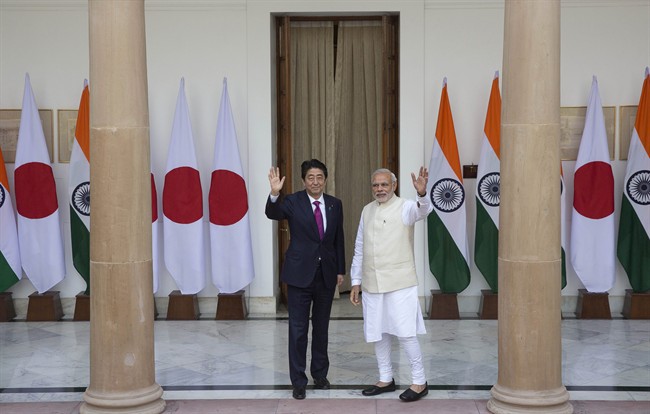NEW DELHI – Japan and India signed agreements Saturday that could pave the way for Tokyo to supply New Delhi with military aircraft and high-speed trains, as Prime Minister Shinzo Abe promised to fully support India’s efforts to become an economic powerhouse.

The two countries also laid the groundwork for Japan to help India further develop its nuclear power, with a final deal to be signed after technical details are finalized.
Abe described the agreements, signed during his weekend visit to New Delhi, as a new era of co-operation between the two countries.
“In September 2014 in Tokyo, Prime Minister Abe spoke of $35 billion of Japanese finance and investments for India over five years,” Indian Prime Minister Narendra Modi said at a news conference with Abe. “It was ambitious. But together, we are quickly turning it into reality.”
Abe said Japan’s co-operation with India in the nuclear field would be limited to peaceful objectives.
READ MORE: Hackers say they crashed Japan prime minister’s website to protest plans for whale hunt
Japan imposed economic sanctions and cut off financial aid to India in 1998, when New Delhi conducted five nuclear tests. The sanctions were lifted in 2001, and bilateral relations have since improved significantly.
On Saturday, Abe referred to India’s stand that it would continue a moratorium on nuclear tests and advance its use of nuclear energy for peaceful purposes.
India, which has 21 nuclear power plants, has ambitious plans to quadruple its current 5,000 megawatts of nuclear power to 20,000 megawatts by 2020 to fuel the energy demands of its booming economy.
The two countries also signed a deal that would help India’s efforts to upgrade its military equipment. Japan’s possible sale of US-2 amphibious aircraft to India would be Tokyo’s first major military hardware transfer since lifting a postwar ban on the export of defence equipment in 2014.
READ MORE: Fukushima radiation is reaching North America, but the water is still safe
Japan also promised technical and financial support to help India build a high-speed train system using Japan’s Shinkansen bullet trains. The train service would link the Indian financial hub of Mumbai with Ahmadabad, the commercial capital of Modi’s home state, Gujarat, cutting the travel time on the 505-kilometre (315-mile) route from eight hours to two.
India also announced Japan’s participation in the India-U.S. Malabar naval exercises on a regular basis to deal with maritime challenges in the Indo-Pacific region. Modi said India and Japan would work together to promote maritime security in the region.
“We stand strongly for ensuring freedom of navigation and overflight, and unimpeded maritime commerce,” he said. “We believe that disputes must be resolved peacefully and that all countries must abide by international law and norms on maritime issues.”



Comments